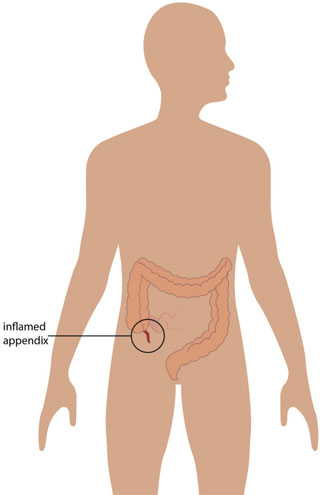 What is the appendix?
What is the appendix?
The appendix is a small (finger size), tube-shaped piece of tissue. The inside forms a pouch which opens into the beginning of the large intestine. The appendix is located in the lower right side of the abdomen (belly area).
What causes appendicitis?
Appendicitis happens when the inside of the appendix becomes blocked by a hard piece of stool (bowel movement), swelling from an infection, or rarely, a tumor. Irritation and swelling from the blockage lead to a lack of blood flow, and then the appendix starts to die. Bacteria then multiply and start to attack the appendix. If the appendix isn’t removed, it’s possible that it may rupture (or burst open), which can cause a serious infection.
What are the most common symptoms of appendicitis?
- Loss of appetite (not hungry)
- Nausea (feeling like you need to throw up)
- Vomiting (throwing up)
- Lower abdominal (belly) pain (below the belly button). Pain may become severe and move to the lower right side
- Fever
Other symptoms may include:
- Diarrhea (loose BMs) and passing a lot of gas
If you’re having bad pain in your lower belly, it’s important to contact your health care provider right away so he or she can figure out what’s wrong. If you have appendicitis, you’ll need treatment as soon as possible.
Is there a test for appendicitis?
Although there’s not one “test” for appendicitis, your health care provider will be able to suspect that you may have it. He or she will likely ask you about your symptoms, touch the lower right side of your abdomen, and may perform blood tests or take images by an ultrasound or CT.
Is there a treatment for appendicitis?
Yes. If you have appendicitis you’ll need to have treatment as soon as possible. This is because the longer a person waits for treatment, the more likely their appendix is to burst. The way that appendicitis is treated is through an operation called an “appendectomy,” pronounced: app-en-dec-toe-me. There are some research studies in which antibiotics are given for early appendicitis but the symptoms often come back in the next year.
What happens during an appendectomy?
Your nurse or doctor will explain what will happen. You should also ask questions so you know what to expect. You will be given anesthesia, which is a special medicine that will put you into a deep sleep and prevent you from feeling any pain during the operation. When you are asleep, your doctor will make a small incision in your belly and remove your appendix. Once your appendix is removed, your doctor will stitch the skin back together. Some stitches will need to be removed in about a week and other stitches dissolve on their own.
What happens after an appendectomy?
After your appendectomy, you’ll have to stay in the hospital, but the length of time depends on whether your appendix burst or not. If you don’t have any complications, you’ll likely just need to stay in the hospital overnight. If your appendix burst or you have a fever, you will need to stay in the hospital a little longer. Your doctor will give you a follow-up appointment so he/she can check to make sure you are healing well. It is very important to keep this appointment.
Am I going to be ok without an appendix?
Yes. Living without an appendix will not cause any problems. However, it’s important to be excused from gym class, sports, and very physical activity for 2-4 weeks after your surgery.
Source: Read Full Article